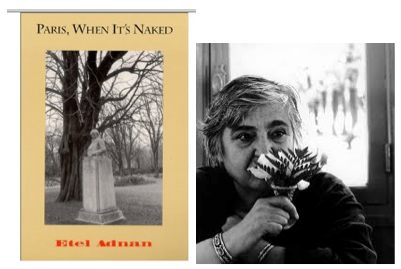Etel Adnan's 'Paris, When It’s Naked'
The poet's novel

A novel in which the subject is Paris. A collage novel. A list novel. A novel of various forms of hopefulness and despair.
“We’re moving towards something that does not exist. The voyage is infinite. The passenger is not.” [1].
Where has Adnan taken the form of the novel, as a poet of many countries and languages? She has chosen place for character. She has chosen Paris, all of Paris. Her gaze penetrates the beauty and limitations. She does not ignore Paris as “the heart of a lingering colonial power.” She has taken the reader not only to the streets of Paris, but to the skies, and to the passing thoughts of the relocated Parisian who writes through circumstances, concerns, observations.
“Some rare evenings, the glow is so strong that pink hue, an after hue, an illumination made of color and fire, seeps between the buildings, these evenings which are an illumination for the whole body, not only the eyes.” [2].
That no other persons come into focus for more than a moment creates an experimental cinematic sense of the city. We are lured toward not merely a visual surface but a detailed map of luminosities and gravities
“Paris has to be reduced to energy points, has to be obliterated, and then rebuilt by one’s mind in order to be livable. Otherwise you become car fumes, pornographic junk, a ball of hatred, the most fallen of the banished angels.” [3].
At the same time the body of the speaker is walking through the streets, taking part in what she observes by embodying many possibilities of experience, she is also composing questions about existence, language, and perception. This novel, located in a city extends outward from that city to exist on many planes, locations, and modes of consciousness. She writes:
“I was trying this morning to figure out how one could think without words. A noble desire, I thought. I wanted to get close to what I presume could be forms of animal thinking: what happens in a cat’s brain when a cat decides between jumping and not jumping? Does his whole body think? [4]
Apparently, the entire body of the poet speaks through this gem-like prismatic work.
“Our dying is imperceptible” [5]
Notes:
1. Etel Adnan, Paris, When It’s Naked, (Sausalito, CA, Post-Apollo Press, 1993). 94.
The poet's novel